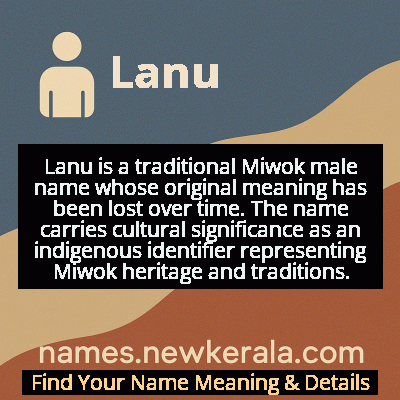Lanu Name Meaning & Details
Origin, Popularity, Numerology Analysis & Name Meaning of Lanu
Discover the origin, meaning, and cultural significance of the name LANU. Delve into its historical roots and explore the lasting impact it has had on communities and traditions.
Name
Lanu
Gender
Male
Origin
Native
Lucky Number
3
Meaning of the Name - Lanu
Lanu is a traditional Miwok male name whose original meaning has been lost over time. The name carries cultural significance as an indigenous identifier representing Miwok heritage and traditions.
Lanu - Complete Numerology Analysis
Your Numerology Number
Based on Pythagorean Numerology System
Ruling Planet
Jupiter
Positive Nature
Optimistic, inspirational, and creative.
Negative Traits
Scattered, exaggerating.
Lucky Colours
Yellow, gold, purple.
Lucky Days
Thursday.
Lucky Stones
Yellow sapphire.
Harmony Numbers
1, 2, 9.
Best Suited Professions
Arts, writing, communication.
What People Like About You
Creativity, optimism.
Famous People Named Lanu
Lanu Faletou
Musician
Lead singer of Australian R&B group The Beautiful Girls
Lanu Tuitavuki
Rugby Player
Fijian rugby union player who represented Fiji internationally
Lanu Tualima
Community Leader
Miwok cultural preservation activist and tribal elder
Name Variations & International Equivalents
Click on blue names to explore their detailed meanings. Gray names with will be available soon.
Cultural & Historical Significance
As a male name within Miwok society, Lanu would have been given with consideration of family lineage, spiritual significance, or characteristics observed at birth. Miwok naming traditions often reflected the natural environment, with names sometimes relating to animals, geographical features, or seasonal phenomena. The continued use of traditional names like Lanu represents resistance to cultural assimilation and honors ancestral heritage in modern indigenous identity.
Extended Personality Analysis
Individuals named Lanu are often perceived as having a strong connection to nature and tradition, reflecting the cultural roots of their name. They tend to be grounded, practical people with a deep sense of responsibility to their community and heritage. Many exhibit quiet strength and resilience, able to endure challenges with patience and determination. Their connection to ancestral wisdom often makes them excellent listeners and observers, with an intuitive understanding of people and situations.
Lanu-named individuals typically value authenticity and may demonstrate a thoughtful, contemplative nature. They often possess a calm demeanor that can be mistaken for reserve, but those who know them well appreciate their loyalty and depth of character. Many show artistic or creative tendencies, particularly in crafts or storytelling that honor traditional ways. Their strength lies in their ability to bridge traditional wisdom with contemporary life, making them valuable mediators between generations and cultures.
Modern Usage & Popularity
In contemporary times, Lanu remains a rare name primarily used within Miwok and broader Native American communities as part of cultural preservation efforts. It has seen minimal usage in mainstream naming trends, maintaining its status as a culturally specific identifier. The name occasionally appears in multicultural families or among parents seeking unique names with indigenous roots. Its usage patterns reflect a conscious choice to honor Native heritage rather than following popular naming conventions, with most bearers having direct connection to Miwok or related tribal backgrounds.
Symbolic & Spiritual Meanings
Symbolically, Lanu represents cultural continuity and indigenous resilience. The name carries connotations of earth connection, ancestral wisdom, and the preservation of traditional knowledge. It symbolizes the enduring spirit of Native peoples despite historical challenges and cultural suppression. Metaphorically, Lanu can represent a bridge between past and present, honoring traditions while navigating contemporary life. The name embodies qualities of authenticity, cultural pride, and the importance of maintaining unique cultural identities in an increasingly homogenized world.

